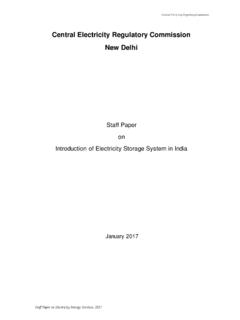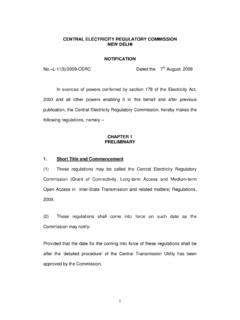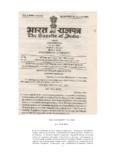Transcription of CENTRAL ELECTRICITY REGULATORY COMMISSION NEW …
1 1 CENTRAL ELECTRICITY REGULATORY COMMISSION NEW DELHI (160)/2008-CERC Dated 19th January, 2009 NOTIFICATION In exercise of powers conferred under section 178 of the ELECTRICITY Act, 2003 (36 of 2003), and all other powers enabling it in this behalf, and after previous publication, the CENTRAL ELECTRICITY REGULATORY COMMISSION hereby makes the following regulations, namely: CHAPTER - 1 PRELIMINARY 1. Short title and commencement. (1) These regulations may be called the CENTRAL ELECTRICITY REGULATORY COMMISSION (Terms and Conditions of Tariff) Regulations, 2009. (2) These regulations shall come into force on , and unless reviewed earlier or extended by the COMMISSION , shall remain in force for a period of 5 years from the date of commencement: Provided that where a project, or a part thereof, has been declared under commercial operation before the date of commencement of these regulations and whose tariff has not been finally determined by the COMMISSION till that date, tariff in respect of such project or such part thereof for the period ending shall be determined in accordance with the CENTRAL ELECTRICITY REGULATORY COMMISSION (Terms and Conditions of Tariff) Regulations, 2004.
2 2. Scope and extent of application. These regulations shall apply in all cases where tariff for a generating station or a unit thereof (other than those based on non-conventional2 energy sources) and the transmission system is to be determined by the COMMISSION under section 62 of the Act read with section 79 thereof. 3. Definitions. - In these regulations, unless the context otherwise requires,-(1) Act means the ELECTRICITY Act, 2003 (36 of 2003); (2) expenditure incurred means the fund, whether the equity or debt or both, actually deployed and paid in cash or cash equivalent, for creation or acquisition of a useful asset and does not include commitments or liabilities for which no payment has been released; (3) additional capitalisation' means the capital expenditure incurred or projected to be incurred, after the date of commercial operation of the project and admitted by the COMMISSION after prudence check, subject to provisions of regulation 9.
3 (4) 'auxiliary energy consumption' or 'AUX' in relation to a period in case of a generating station means the quantum of energy consumed by auxiliary equipment of the generating station, and transformer losses within the generating station, expressed as a percentage of the sum of gross energy generated at the generator terminals of all the units of the generating station; (5) auditor means an auditor appointed by the generating company or the transmission licensee, as the case may be, in accordance with the provisions of sections 1[224, 233B and 619 of the Companies Act, 1956 (1 of 1956)], or any other law for the time being in force; (6) beneficiary in relation to a generating station means the person purchasing ELECTRICITY generated at such a generating station whose tariff is determined under these regulations; 1 Substituted vide Corrigendum to CENTRAL ELECTRICITY REGULATORY COMMISSION (Terms & Conditions of Tariff) Regulations 2009, published in the Gazette of India (Extraordinary) Part III, Section 4 on 3 (7) block in relation to a combined cycle thermal generating station includes combustion turbine-generator, associated waste heat recovery boiler, connected steam turbine- generator and auxiliaries; (8) capital cost means the capital cost as defined in regulation 7.
4 (9) change in law means occurrence of any of the following events: (i) the enactment, bringing into effect, adoption, promulgation, amendment, modification or repeal of any law; or (ii) change in interpretation of any law by a competent court, Tribunal or Indian Governmental Instrumentality which is the final authority under law for such interpretation; or (iii) change by any competent statutory authority, in any consent, approval or licence available or obtained for the project. (10) ' COMMISSION ' means the CENTRAL ELECTRICITY REGULATORY COMMISSION referred to in sub-section (1) of section 76 of the Act; (11) cut-off date means 31st March of the year closing after two years of the year of commercial operation of the project, and in case the project is declared under commercial operation in the last quarter of a year, the cut-off date shall be 31st March of the year closing after three years of the year of commercial operation.
5 (12) date of commercial operation or COD means (a) in relation to a unit or block of the thermal generating station, the date declared by the generating company after demonstrating the maximum continuous rating (MCR) or the installed capacity (IC) through a successful trial run after notice to the beneficiaries, from 0000 hour of which scheduling process as per the Indian ELECTRICITY Grid Code (IEGC) is fully implemented, and in relation to the generating station as a whole, the date of commercial operation of the last unit or block of the generating station; 4 (b) in relation to a unit of hydro generating station, the date declared by the generating company from 0000 hour of which, after notice to the beneficiaries, scheduling process in accordance with the Indian ELECTRICITY Grid Code is fully implemented, and in relation to the generating station as a whole, the date declared by the generating company after demonstrating peaking capability corresponding to installed capacity of the generating station through a successful trial run, after notice to the beneficiaries: Note 1.
6 In case the hydro generating station with pondage or storage is not able to demonstrate peaking capability corresponding to the installed capacity for the reasons of insufficient reservoir or pond level, the date of commercial operation of the last unit of the generating station shall be considered as the date of commercial operation of the generating station as a whole, provided that it will be mandatory for such hydro generating station to demonstrate peaking capability equivalent to installed capacity of the generating unit or the generating station as and when such reservoir /pond level is achieved. 2. In case of purely run-of-river hydro generating station if the unit or the generating station is declared under commercial operation during lean inflows period when the water is not sufficient for such demonstration, it shall be mandatory for such hydro generating station or unit to demonstrate peaking capability equivalent to installed capacity as and when sufficient inflow is available.
7 (c) in relation to the transmission system, the date declared by the transmission licensee from 0000 hour of which an element of the transmission system is in regular service after successful charging and trial operation: 5 Provided that the date shall be the first day of a calendar month and transmission charge for the element shall be payable and its availability shall be accounted for, from that date: Provided further that in case an element of the transmission system is ready for regular service but is prevented from providing such service for reasons not attributable to the transmission licensee, its suppliers or contractors, the COMMISSION may approve the date of commercial operation prior to the element coming into regular service. (13) day means the 24 hour period starting at 0000 hour; (14) declared capacity or DC' in relation to a generating station means, the capability to deliver ex-bus ELECTRICITY in MW declared by such generating station in relation to any time-block of the day or whole of the day, duly taking into account the availability of fuel or water, and subject to further qualification in the relevant regulation; (15) 'design energy' means the quantum of energy which can be generated in a 90% dependable year with 95% installed capacity of the hydro generating station; (16) `existing generating station' means a generating station declared under commercial operation from a date prior to.
8 (17) `existing project means the project declared under commercial operation from a date prior to ; (18) `gross calorific value or GCV in relation to a thermal generating station means the heat produced in kCal by complete combustion of one kilogram of solid fuel or one litre of liquid fuel or one standard cubic meter of gaseous fuel, as the case may be; 6 (19) `gross station heat rate or GHR means the heat energy input in kCal required to generate one kWh of electrical energy at generator terminals of a thermal generating station; (20) infirm power means ELECTRICITY injected into the grid prior to the commercial operation of a unit or block of the generating station; (21) installed capacity' or 'IC means the summation of the name plate capacities of all the units of the generating station or the capacity of the generating station (reckoned at the generator terminals), approved by the COMMISSION from time to time; (22) implementation agreement means the agreement, contract or memorandum of understanding, or any such covenant, entered into between the transmission licensee and the long-term transmission customer for construction of the transmission system; (23) inter-State generating station or ISGS has the meaning as assigned in the Indian ELECTRICITY Grid Code specified by the COMMISSION .
9 (24) 'long-term transmission customer' means a person having a long-term contractual right to use inter-State transmission system by paying transmission charges; (25) maximum continuous rating' or `MCR in relation to a unit of the thermal generating station means the maximum continuous output at the generator terminals, guaranteed by the manufacturer at rated parameters, and in relation to a block of a combined cycle thermal generating station means the maximum continuous output at the generator terminals, guaranteed by the manufacturer with water or steam injection (if applicable) and corrected to 50 Hz grid frequency and specified site conditions; (26) medium term in the context of usage of transmission system means the period exceeding three months and up to three years.
10 7 (27) normative annual plant availability factor or NAPAF in relation to a generating station means the availability factor specified in regulation 26 for thermal generating station and in regulation 27 for hydro generating station; (28) 'operation and maintenance expenses or O&M expenses' means the expenditure incurred on operation and maintenance of the project, or part thereof, and includes the expenditure on manpower, repairs, spares, consumables, insurance and overheads; (29) `original project cost' means the capital expenditure incurred by the generating company or the transmission licensee, as the case may be, within the original scope of the project up to the cut-off date as admitted by the COMMISSION ; (30) 'plant availability factor (PAF)' in relation to a generating station for any period means the average of the daily declared capacities (DCs) for all the days during that period expressed as a percentage of the installed capacity in MW reduced by the normative auxiliary energy consumption.










